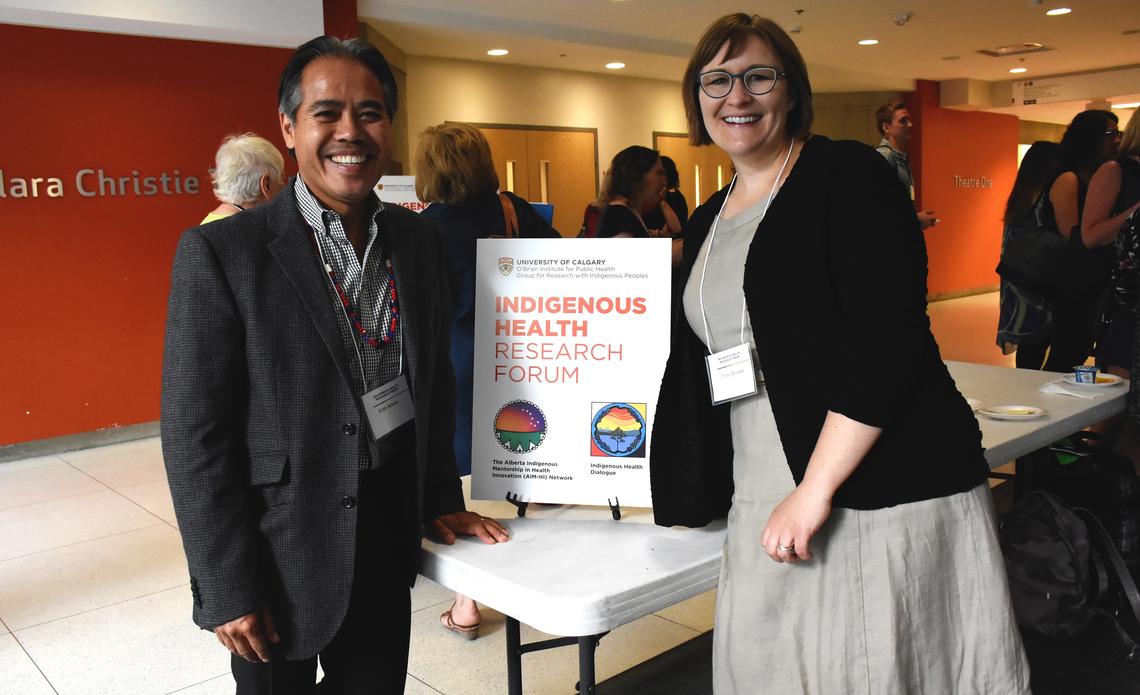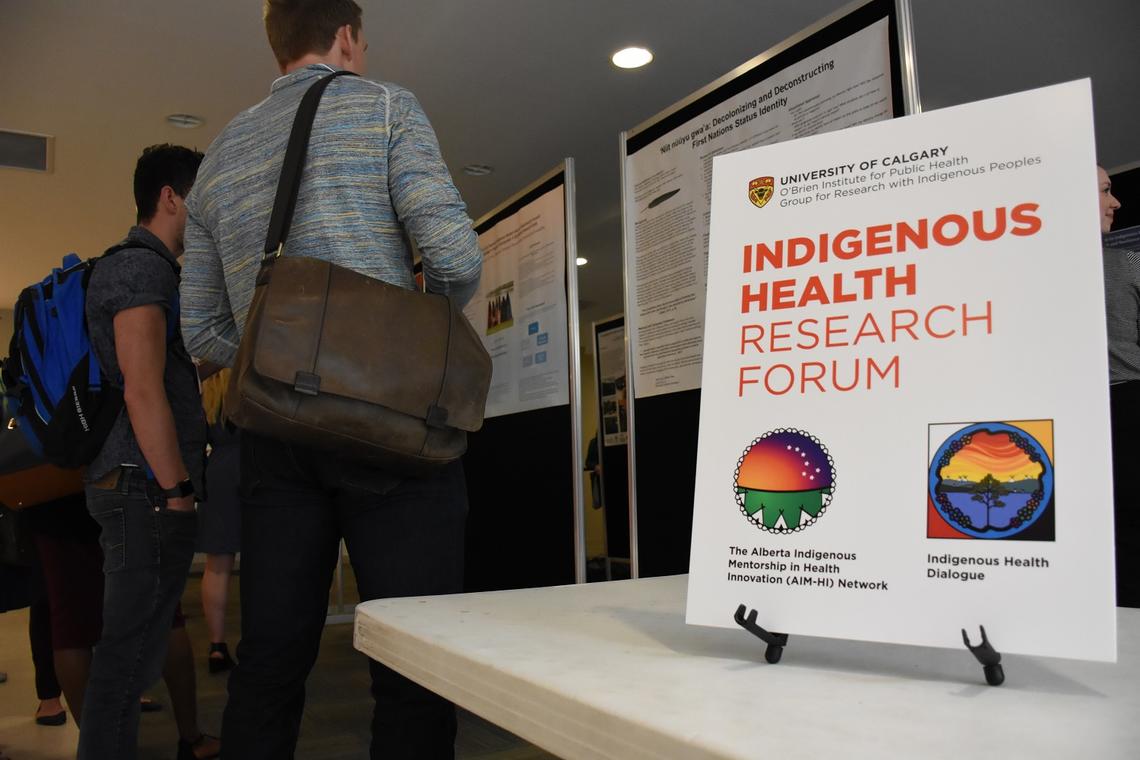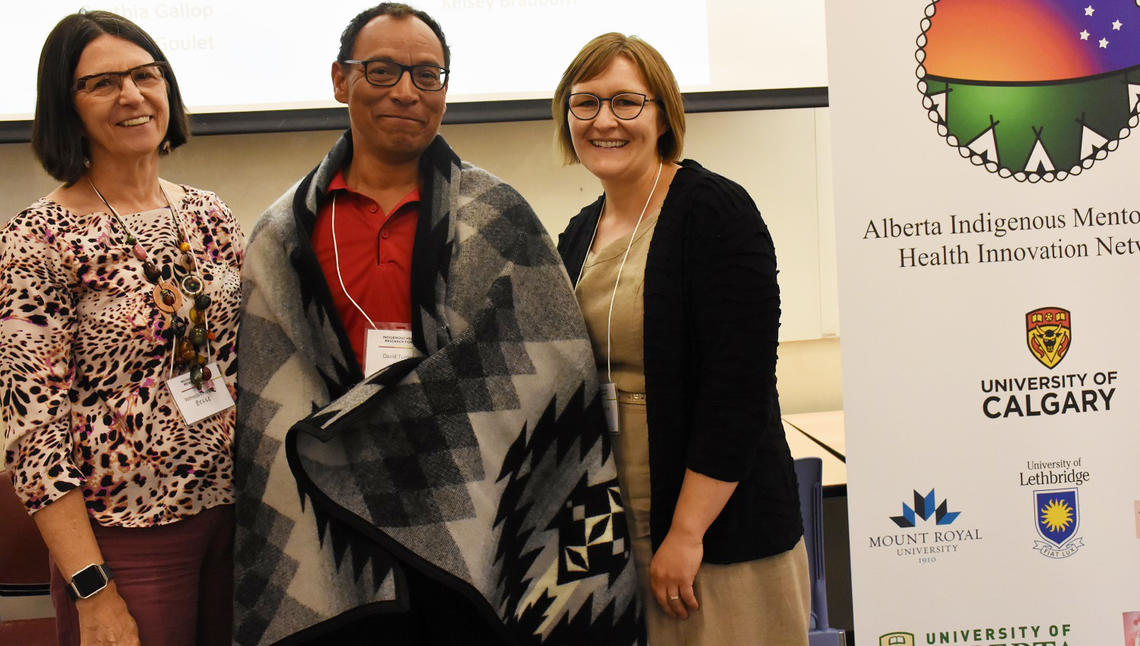
Evan Adams, actor and chief medical officer for the First Nations Health Authority in B.C., left.
Michael Wood, O'Brien Institute for Public Health
June 1, 2018

Evan Adams, actor and chief medical officer for the First Nations Health Authority in B.C., left.
Michael Wood, O'Brien Institute for Public Health
Models of midwifery care for Indigenous women. Siksikaitsitapi parenting of children with disabilities. Understanding the health impacts to Indigenous people and communities after the Fort McMurray fire. Adverse childhood experiences and health behaviours among Indigenous people experiencing homelessness.
These were just a handful of the projects showcased in the annual Group for Research with Indigenous Peoples (GRIP) forum, this year co-hosted by the Alberta Indigenous Mentorship in Health Innovation, or AIM-HI, Network and the Strategic Partnerships and Community Engagement Office of the Cumming School of Medicine (CSM). The collaboration brought together more than 100 academics, students and community members for an exploration of self-determination and transformation of Indigenous health at the University of Calgary.
“The lack of knowledge of Indigenous communities about how research can help them speaks to the lack of relationship between the research community and Indigenous communities,” says Dr. Evan Adams, an actor with dozens of credits to his name, including Smoke Signals, Indian Horse and The Beachcombers, who is now chief medical officer of the B.C. First Nations Health Authority and who provided the keynote address.
“That’s where all the people here at this conference come in. They can bridge, they can work between the two, but it means respect between those two worlds. Aboriginal people need to lead their own initiatives, so even though we’re all working collectively together, Indigenous people need to be at the helm of any of these efforts. And hopefully, the time of making policy and decisions about Indigenous people without Indigenous people being at the table is over."
Academics and researchers from across Western Canada filled the Clara Christie Theatre to hear Adams, who is Coast Salish from British Columbia’s Sliammon First Nation, explore the Indigenous perspective in health and research and to provide a glimpse into B.C.’s self-determined health authority, how it operates, and how it determined its priorities through community engagement.
“This event had our highest attendance to date,” says Dr. Cheryl Barnabe, a Métis rheumatologist and co-chair for GRIP at the O’Brien Institute for Public Health.

“This event had our highest attendance to date,” says Dr. Cheryl Barnabe.
GRIP is a network of more than 200 health researchers, students, care providers and community members working together for a holistic approach to Indigenous health while ensuring UCalgary upholds respectful research processes.
“The forum provides a space for Indigenous health research from a variety of disciplines, research approaches and topics, and highlights the good work done by our faculty and students,” Barnabe says of the forum, which included a celebration of students involved in the Alberta Indigenous Mentorship Health Innovation (AIM-HI) Network, “an important step to promoting and supporting the achievements of our Indigenous scholars.”
For Métis researcher Indiana Best, the day was a meaningful way to connect with her culture and to showcase her work from the Master of Public Health program at the University of Saskatchewan. Best is examining cultural interventions in harm reduction and treatment options for members of the Métis community with substance use issues in Saskatoon.
“The Indigenous experience is not often explored by Western institutions, you don’t have that understanding about colonization and how it’s impacted Indigenous health,” says Best, who received her Bachelor in Health Sciences at UCalgary.
“In order to reconcile, you need to have truth and truth is acknowledging what has happened. A lot of health practitioners and service providers aren’t always aware of the reasons why Indigenous populations are facing the issues they’re facing, so it’s great to have the opportunity to talk to other people about that and for people to understand and to learn from one another.”
Dr. Cheryl Barnabe is an associate professor in the departments of Medicine and Community Health Sciences and a member of the O’Brien Institute at CSM.
The University of Calgary unveiled its Indigenous Strategy, ii' taa' poh' to' p, on Nov. 16. The strategy is the result of nearly two years of community dialogue and campus engagement, and involved the work of a number of people from the university, Indigenous communities and community stakeholders. Recommendations from the strategy will be implemented in the coming weeks, months and years as we move forward with promise, hope and caring for the future.

It was also a chance to thank David Turner, GRIP's outgoing co-chair, for all his contributions.